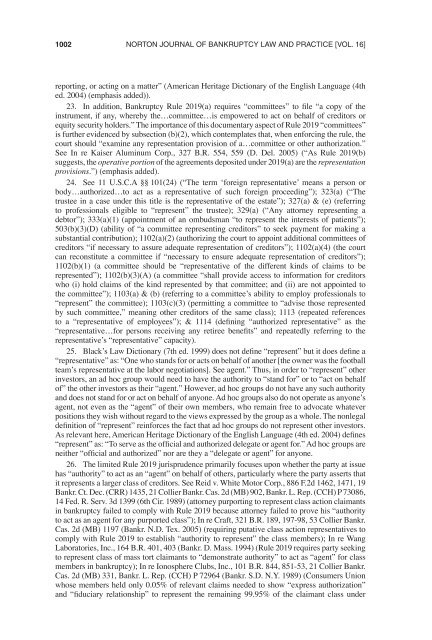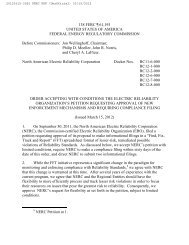Ad Hoc Committees and the Misuse of Bankruptcy Rule 2019
Ad Hoc Committees and the Misuse of Bankruptcy Rule 2019
Ad Hoc Committees and the Misuse of Bankruptcy Rule 2019
Create successful ePaper yourself
Turn your PDF publications into a flip-book with our unique Google optimized e-Paper software.
1002 Norton Journal <strong>of</strong> <strong>Bankruptcy</strong> Law <strong>and</strong> Practice [Vol. 16]<br />
reporting, or acting on a matter” (American Heritage Dictionary <strong>of</strong> <strong>the</strong> English Language (4th<br />
ed. 2004) (emphasis added)).<br />
23. In addition, <strong>Bankruptcy</strong> <strong>Rule</strong> <strong>2019</strong>(a) requires “committees” to file “a copy <strong>of</strong> <strong>the</strong><br />
instrument, if any, whereby <strong>the</strong>…committee…is empowered to act on behalf <strong>of</strong> creditors or<br />
equity security holders.” The importance <strong>of</strong> this documentary aspect <strong>of</strong> <strong>Rule</strong> <strong>2019</strong> “committees”<br />
is fur<strong>the</strong>r evidenced by subsection (b)(2), which contemplates that, when enforcing <strong>the</strong> rule, <strong>the</strong><br />
court should “examine any representation provision <strong>of</strong> a…committee or o<strong>the</strong>r authorization.”<br />
See In re Kaiser Aluminum Corp., 327 B.R. 554, 559 (D. Del. 2005) (“As <strong>Rule</strong> <strong>2019</strong>(b)<br />
suggests, <strong>the</strong> operative portion <strong>of</strong> <strong>the</strong> agreements deposited under <strong>2019</strong>(a) are <strong>the</strong> representation<br />
provisions.”) (emphasis added).<br />
24. See 11 U.S.C.A §§ 101(24) (“The term ‘foreign representative’ means a person or<br />
body…authorized…to act as a representative <strong>of</strong> such foreign proceeding”); 323(a) (“The<br />
trustee in a case under this title is <strong>the</strong> representative <strong>of</strong> <strong>the</strong> estate”); 327(a) & (e) (referring<br />
to pr<strong>of</strong>essionals eligible to “represent” <strong>the</strong> trustee); 329(a) (“Any attorney representing a<br />
debtor”); 333(a)(1) (appointment <strong>of</strong> an ombudsman “to represent <strong>the</strong> interests <strong>of</strong> patients”);<br />
503(b)(3)(D) (ability <strong>of</strong> “a committee representing creditors” to seek payment for making a<br />
substantial contribution); 1102(a)(2) (authorizing <strong>the</strong> court to appoint additional committees <strong>of</strong><br />
creditors “if necessary to assure adequate representation <strong>of</strong> creditors”); 1102(a)(4) (<strong>the</strong> court<br />
can reconstitute a committee if “necessary to ensure adequate representation <strong>of</strong> creditors”);<br />
1102(b)(1) (a committee should be “representative <strong>of</strong> <strong>the</strong> different kinds <strong>of</strong> claims to be<br />
represented”); 1102(b)(3)(A) (a committee “shall provide access to information for creditors<br />
who (i) hold claims <strong>of</strong> <strong>the</strong> kind represented by that committee; <strong>and</strong> (ii) are not appointed to<br />
<strong>the</strong> committee”); 1103(a) & (b) (referring to a committee’s ability to employ pr<strong>of</strong>essionals to<br />
“represent” <strong>the</strong> committee); 1103(c)(3) (permitting a committee to “advise those represented<br />
by such committee,” meaning o<strong>the</strong>r creditors <strong>of</strong> <strong>the</strong> same class); 1113 (repeated references<br />
to a “representative <strong>of</strong> employees”); & 1114 (defining “authorized representative” as <strong>the</strong><br />
“representative…for persons receiving any retiree benefits” <strong>and</strong> repeatedly referring to <strong>the</strong><br />
representative’s “representative” capacity).<br />
25. Black’s Law Dictionary (7th ed. 1999) does not define “represent” but it does define a<br />
“representative” as: “One who st<strong>and</strong>s for or acts on behalf <strong>of</strong> ano<strong>the</strong>r [<strong>the</strong> owner was <strong>the</strong> football<br />
team’s representative at <strong>the</strong> labor negotiations]. See agent.” Thus, in order to “represent” o<strong>the</strong>r<br />
investors, an ad hoc group would need to have <strong>the</strong> authority to “st<strong>and</strong> for” or to “act on behalf<br />
<strong>of</strong>” <strong>the</strong> o<strong>the</strong>r investors as <strong>the</strong>ir “agent.” However, ad hoc groups do not have any such authority<br />
<strong>and</strong> does not st<strong>and</strong> for or act on behalf <strong>of</strong> anyone. <strong>Ad</strong> hoc groups also do not operate as anyone’s<br />
agent, not even as <strong>the</strong> “agent” <strong>of</strong> <strong>the</strong>ir own members, who remain free to advocate whatever<br />
positions <strong>the</strong>y wish without regard to <strong>the</strong> views expressed by <strong>the</strong> group as a whole. The nonlegal<br />
definition <strong>of</strong> “represent” reinforces <strong>the</strong> fact that ad hoc groups do not represent o<strong>the</strong>r investors.<br />
As relevant here, American Heritage Dictionary <strong>of</strong> <strong>the</strong> English Language (4th ed. 2004) defines<br />
“represent” as: “To serve as <strong>the</strong> <strong>of</strong>ficial <strong>and</strong> authorized delegate or agent for.” <strong>Ad</strong> hoc groups are<br />
nei<strong>the</strong>r “<strong>of</strong>ficial <strong>and</strong> authorized” nor are <strong>the</strong>y a “delegate or agent” for anyone.<br />
26. The limited <strong>Rule</strong> <strong>2019</strong> jurisprudence primarily focuses upon whe<strong>the</strong>r <strong>the</strong> party at issue<br />
has “authority” to act as an “agent” on behalf <strong>of</strong> o<strong>the</strong>rs, particularly where <strong>the</strong> party asserts that<br />
it represents a larger class <strong>of</strong> creditors. See Reid v. White Motor Corp., 886 F.2d 1462, 1471, 19<br />
Bankr. Ct. Dec. (CRR) 1435, 21 Collier Bankr. Cas. 2d (MB) 902, Bankr. L. Rep. (CCH) P 73086,<br />
14 Fed. R. Serv. 3d 1399 (6th Cir. 1989) (attorney purporting to represent class action claimants<br />
in bankruptcy failed to comply with <strong>Rule</strong> <strong>2019</strong> because attorney failed to prove his “authority<br />
to act as an agent for any purported class”); In re Craft, 321 B.R. 189, 197-98, 53 Collier Bankr.<br />
Cas. 2d (MB) 1197 (Bankr. N.D. Tex. 2005) (requiring putative class action representatives to<br />
comply with <strong>Rule</strong> <strong>2019</strong> to establish “authority to represent” <strong>the</strong> class members); In re Wang<br />
Laboratories, Inc., 164 B.R. 401, 403 (Bankr. D. Mass. 1994) (<strong>Rule</strong> <strong>2019</strong> requires party seeking<br />
to represent class <strong>of</strong> mass tort claimants to “demonstrate authority” to act as “agent” for class<br />
members in bankruptcy); In re Ionosphere Clubs, Inc., 101 B.R. 844, 851-53, 21 Collier Bankr.<br />
Cas. 2d (MB) 331, Bankr. L. Rep. (CCH) P 72964 (Bankr. S.D. N.Y. 1989) (Consumers Union<br />
whose members held only 0.05% <strong>of</strong> relevant claims needed to show “express authorization”<br />
<strong>and</strong> “fiduciary relationship” to represent <strong>the</strong> remaining 99.95% <strong>of</strong> <strong>the</strong> claimant class under



